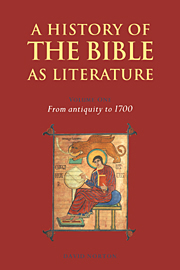Book contents
- Frontmatter
- Contents
- List of plates
- Preface
- List of abbreviations
- 1 ‘This treasure in earthen vessels’
- 2 The early Christians and biblical eloquence
- 3 Jerome
- 4 Augustine and his successors
- 5 The occult text
- 6 The challenge to the translators
- 7 Slaves of the Vulgate
- 8 Creators of English
- 9 From the Great Bible to the Rheims-Douai Bible
- 10 The King James Bible
- 11 Presentations of the text, 1525–1625
- 12 Sixteenth-century movements towards literary praise and appreciation of the Bible
- 13 The struggle for acceptance
- 14 ‘The eloquentest books in the world’
- 15 Versifying the Psalms
- 16 ‘The best materials in the world for poesy’
- Appendix
- Bibliography
- General index
- Biblical index
- Plate section
14 - ‘The eloquentest books in the world’
Published online by Cambridge University Press: 05 June 2012
- Frontmatter
- Contents
- List of plates
- Preface
- List of abbreviations
- 1 ‘This treasure in earthen vessels’
- 2 The early Christians and biblical eloquence
- 3 Jerome
- 4 Augustine and his successors
- 5 The occult text
- 6 The challenge to the translators
- 7 Slaves of the Vulgate
- 8 Creators of English
- 9 From the Great Bible to the Rheims-Douai Bible
- 10 The King James Bible
- 11 Presentations of the text, 1525–1625
- 12 Sixteenth-century movements towards literary praise and appreciation of the Bible
- 13 The struggle for acceptance
- 14 ‘The eloquentest books in the world’
- 15 Versifying the Psalms
- 16 ‘The best materials in the world for poesy’
- Appendix
- Bibliography
- General index
- Biblical index
- Plate section
Summary
Divine inspiration
From patristic times belief that every word of the Scripture was directly inspired by God had led some men to conclusions about literary quality (see above, pp. 202 etc.). Now in the seventeenth century, whether believed in or not, divine inspiration became the central issue in literary attitudes to the originals. William Chilling worth (1602–44), a controversialist mostly on the Protestant side, makes the necessary initial point in flatly asserting the primacy of faith over human reason where the Bible is concerned: ‘propose me anything out of [the Bible]’, he declares, ‘and require whether I believe it or no, and seem it never so incomprehensible to human reason, I will subscribe it with hand and heart, as knowing no demonstration can be stronger than this, God hath said so, therefore it is true. In other things’, he adds, ‘I will take no man's liberty of judgement from him, neither shall any man take mine from me’ (p. 376). Faith and reason were two separate elements in the seventeenth century's idea of the mind of man: divine inspiration and the consequent literary ideas belonged with faith.
If one looks to Calvin in particular as a seminal figure in establishing this separation between faith and reason, the contrast that there was between him and Becon is again evident (see above, pp. 196ff.). Chillingworth's remark exhibits the dogmatic simplification that characterises most (but not all) of the century's religious ideas. The Westminster Confession of Faith (1647) takes us further.
- Type
- Chapter
- Information
- A History of the Bible as Literature , pp. 237 - 273Publisher: Cambridge University PressPrint publication year: 1993



